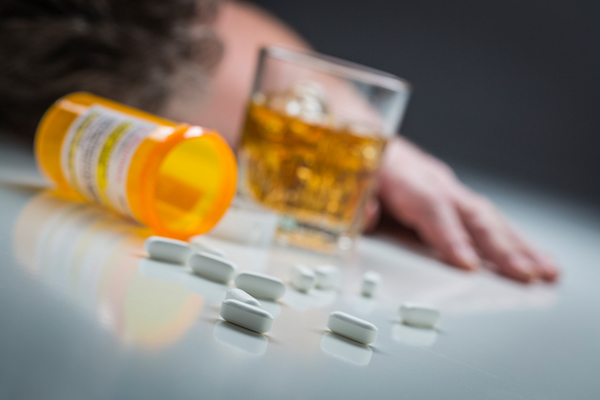Mental health is a complex and delicate issue and one that can vary dramatically by the individual. The set of circumstances that might send one person spiraling into a depressive episode, for example, might not even phase someone with different genetic, biological, environmental, and psychological factors. As such, it’s important to approach these issues with patience and compassion because we can’t ever truly get inside another person’s head.
With that said, we’ve discussed the common coexistence of drug dependency and mental health issues in a previous blog—and how tragically frequent it is for those with mental health problems to get booked into jail. When faced with such a situation, mental health professionals generally refer to this situation as a dual diagnosis. According to the National Institute on Drug Abuse, however, individuals addicted to drugs are roughly twice as likely as others to suffer from mood and anxiety disorders—with the reverse also true. This doesn’t necessarily mean that one necessarily caused the other, but it does draw an important correlation for us to consider.

Today, we’ll look at the types of mental health issues that can occur during or after drug dependency:
Depression
Depression is a mental illness that frequently occurs alongside drugs, alcohol, or other substance abuse. While many individuals suffer from periods of grief or sadness, clinical depression goes beyond the normal realm of sadness and is defined by at least two weeks of depressive symptoms. Individuals with drug dependency are uniquely susceptible to depression, as the “high” produced by many substances often leaves the user with withdrawal depression after each usage, which perpetuates the cycle of use. It’s also common for depression to set in for frequent users as they observe the effects of that addiction in their life.
The facts: Nearly one-third of adults who have problems with substance abuse also suffer from depression.
Anxiety
Anxiety is another common mental health issue that drug-dependent individuals may experience. More accurately termed a “mood disorder”, anxiety in these individuals may take place before drug use, after, or during. Anxiety causes strong feelings of fear, worry, or even panic, difficulty relaxing, racing thoughts, and other unpleasant symptoms, and some substances like alcohol or opioids to help to calm these sensations. If anxiety strikes before substance use, the individual may be self-medicating for a pre-existing condition. Conversely, if the anxiety occurs during or immediately after the substance use, it may be a side effect of the drug or made worse by drug use. Some drugs that may initially calm and reduce anxiety initially may make it worse in the long run when the individual stops taking them, creating a withdrawal effect.
The facts: Individuals with an anxiety disorder are about 2 to 3 times as likely to have problems with addiction as those who don’t have anxiety.
Paranoia
While most commonly associated with psychotic disorders, paranoid personality disorder (PPD) most commonly presents during young adulthood. Individuals who suffer from paranoia may feel inordinately suspicious of others, constantly question the actions and motives of others, or perhaps feel that everyone is out to get them. While these feelings are normal to experience occasionally, frequent drug users may experience them more often and more severely because paranoia can be a side effect of both the use and withdrawal of several types of drugs, including alcohol, cocaine, meth, and LSD. While there are varying severities of paranoia, all should be taken seriously and individuals who experience them should seek treatment immediately.
The facts: 62% percent of individuals who are treated for a substance use disorder have a co-occurring personality disorder, and paranoia is one of the most common.
Substance-Induced Psychosis
Many drugs can induce psychotic symptoms that make an individual believe things are happening that are not happening in reality. This is called psychosis and may include visual, auditory, or tactile hallucinations, delusions, or more serious symptoms that may be indicative of severe mental illness. While having similar symptoms, drug-induced psychosis is NOT the same as psychosis caused by conditions like schizophrenia. Drugs that can include these effects either during or after use include meth, cannabis, cocaine, amphetamines, and other psychedelic drugs. Unfortunately, a single dose can result in a drug-induced psychosis. Even alcohol, albeit heavy use of alcohol, can cause psychosis in some cases.
The facts: For example, roughly 50% of cocaine users will show some symptoms of psychosis after use, and those symptoms can sometimes last for years after usage.
Each of these examples are just a small sampling of the negative effects that individuals who struggle with drug dependency may experience. In addition to these mental health issues, drug users will often experience physical symptoms as well, like inability to sleep, sudden weight loss or gain, and/or deterioration of physical appearance—which can be just as dangerous to their overall long-term health. In either circumstance, the result is clear: Drugs are dangerous, and drug dependency can pose serious consequences for both your physical and mental health.
If you or a loved one are struggling with any of the above mental health issues or others, the National Alliance on Mental Health (NAMI) has a thorough list of both local and online resources listed on their website. Or, you can call the Substance Abuse and Mental Health Services Administration (SAMHSA) Treatment Referral Helpline at 1-800-662-HELP (4357). Regardless of what you’re going through, you don’t have to do it alone.
